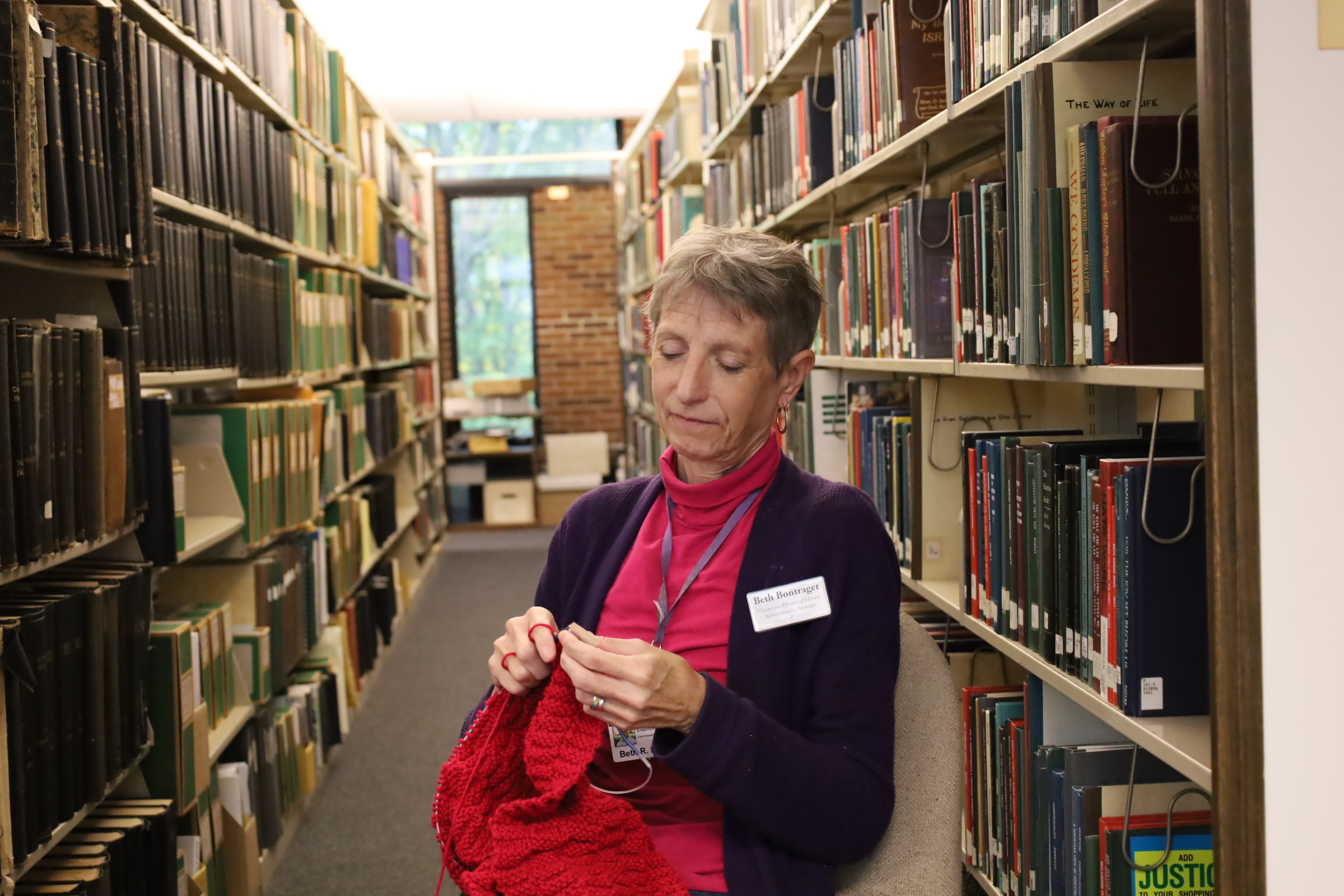If you sit in the back of a concert on campus, you might hear an unexpected sound: the slight click-click-click of knitting needles.
Upon investigation, the odds are that you will find Beth Bontrager, an administrative assistant in the Mennonite Historical Library and subscription manager at The Mennonite Quarterly Review. Along with her professional work, Bontrager is an avid knitter — and she has been for years.“My grandmother was an avid knitter, tatterer, crocheter, sewer, [and] quilter,” Bontrager said. “[She] and my mother taught me to knit when I was … 8 years old.”
Wherever she goes, it seems that Bontrager carries her knitting needles and a current project with her. Bontrager defines multitasking. Midway through our interview, she pulled out a half-finished blanket and started to knit while carrying on the conversation.
“I like to keep my hands busy,” Bontrager said. “I used to bite my nails as a child, and I’d need to do something with my hands … Now, I don’t bite my nails anymore, but I still like to keep my hands busy.”
Bontrager used to make sweaters and other articles of clothing, but she switched to strictly making blankets after growing tired of having to be “so particular” about making sure the patterns matched on more complicated creations. She said having a simple task, such as the repetitive rows on a blanket, allows her to focus better on whatever else she’s engaged in.
Her blankets are typically quite small (think of a childhood blankie), so one might assume it wouldn’t take her too long to make them. After all, knitting can’t take that long — right?
“Typically anywhere from one to two months,” Bontrager said when asked how long she spends on each project. She chuckled and added: “Although it depends on how many concerts I’m ushering!”
Be it a concert, a play, a worship service, or just a conversation, Bontrager says the setting where she knits her blankets is meaningful.
“The emotion and the essence of what I’m experiencing, what others are experiencing around me, goes into the knitting,” she said. “So it’s a blanket of love, a blanket of joy and of music and of pleasure and of that relationship.”
Her blankets go to good use; Bontrager says that over the last few years, she has donated them to the child care program at Goshen High School, where students watch children of local parents.
“What I have done … is to make a blanket for each one of the children that they’re caring for; they’re usually there until the age of 2,” Bontrager said.
What she likes about making blankets for children is that “nobody’s going to care if you knit two stitches together accidentally and then add another one … It’s a cuddle blanket. It should be cuddled.”
A self-proclaimed perfectionist, Bontrager finds important discipline in being able to accept minor mistakes and move on from them.
“[Knitting] is one place where I don’t have to care as much; my tendency is to make everything as perfect as possible … I’m gentle with myself in my knitting,” she said.
This sense of grace is also important for Bontrager’s spiritual life. “Some people pray writing poetry, some people pray molding clay, some fold paper and make paper cranes,” she said, knitting needles clicking softly. “And some people pray in silence, and just knit, and think about the people they love.”
It’s not hard to guess how Bontrager prays — and that prayer helps her day-to-day business.
“There are certain things that we do that keep us grounded,” Bontrager said. “Whether that’s playing Spikeball, or writing in a journal, or playing DnD [Dungeons and Dragons], or knitting, I think everyone should be intentional about making sure we have those.”
While knitting might not be a passion for everyone, Bontrager encourages everyone — especially college students in a stress-filled time of life — to find their “grounding” activity.
About a week after the interview with Bontrager, I was in the middle of one of my grounding activities: singing in Goshen’s homecoming gala. As our last song finished, I looked at the audience, reveling in the applause and searching for my parents and brother.
Instead, I immediately saw Beth Bontrager sitting in one of the front seats of Sauder Concert Hall. And although she didn’t look away from the choir for a second, her hands maneuvered the needles through the yarn deftly and quickly, a broad smile on her face.




